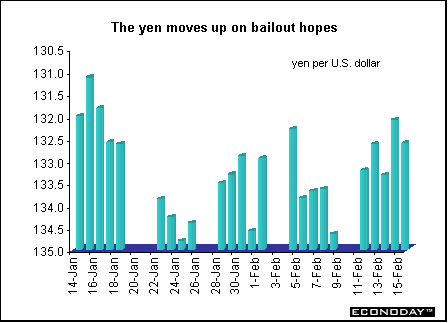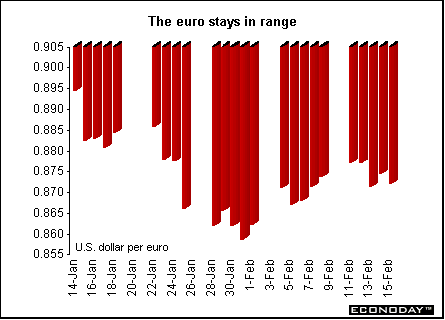
Currencies
The yen rose early in the week as Japanese stocks rallied, improving the attractiveness of the nation's assets and increasing demand for the currency. Stock rallies heighten expectations that foreign investors will put more money into Japanese markets. However, the yen dropped (as did the Nikkei) after Japan's minister for financial services dampened optimism that the government would rescue banks that are burdened with trillions of yen in bad loans. The yen had strengthened against the dollar earlier in the week on speculation the government would help banks stay solvent while they write off loans that aren't being repaid. Japan's banks received 9.3 trillion yen of public funds in 1998 and 1999. Rising bankruptcies also cast a pall on the Nikkei and yen.

The euro and the dollar remained within a narrow trading range despite positive economic news from the United States. The difference between the United States and eurozone economies was illustrated by the most recent retail sales data. Germany's retail sales sank more than expected while U.S. retail sales excluding cars came in well above forecast. Although Germany is just one of twelve EMU countries, it is the largest and in many ways seen as representative of the EMU. The euro surprisingly did not fall on the news that there had been an agreement with Germany and Portugal concerning their budget deficits. Although they are both perilously close to the ordained ceiling of three percent, Ecofin was persuaded to go along with a brokered deal rather than issue sanctions against the two countries.
Despite the less than positive picture, the ECB's latest monthly bulletin repeated most of the lines from the last council press conference, including the ECB's belief that the eurozone will see a gradual recovery beginning in the first half of the year and that the current level of interest rates is appropriate to maintain price stability in the medium term.

So far, however, the dollar has shown only a lackluster response to what is increasingly looking like pretty compelling evidence in support of the greenback. Part of the reason the foreign exchange market's hesitancy on pushing the dollar higher could be that the Fed has indicated that it is not yet entirely convinced that strong U.S. productivity data is believable or sustainable.


Last Week's Highlights • Global Stock Market Indexes • Recap of Global Markets • Currencies • Indicator Scoreboard

The Bottom Line • Looking Ahead
|